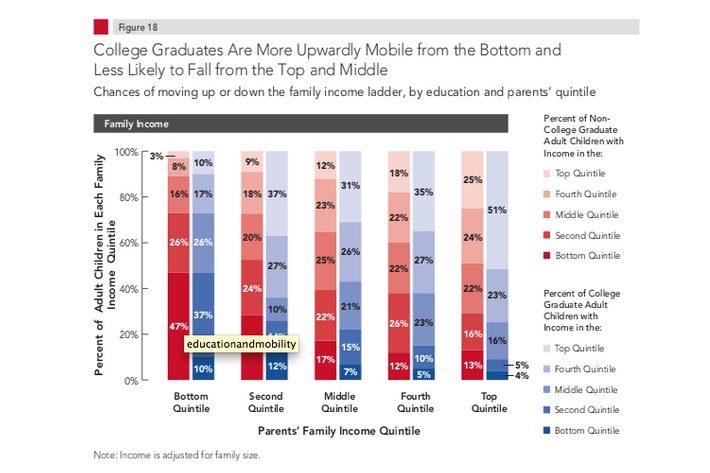
Gregory Mankiw plays a small but important role in the political ecology: an accomplished Harvard professor who validates Republican economic policies. It’s almost impossible to find empirical support for debt-financed tax cuts, but when George W. Bush proposed them, Mankiw and his Harvard pedigree were there to reassure that they were “fiscally responsible” and would surely lead to higher growth. The failure of these reassurances to come true has not prompted Mankiw to reassess his thinking. That’s because the fundamental basis for his beliefs about such matters has nothing to do with economics. Mankiw believes rich people deserve to keep their money, regardless of economic consequences.
Now, many conservatives share this belief, but since it is unpopular, they instead argue that higher taxes on the rich hurt the non-rich. Mankiw, to his enormous credit, does not conceal his agenda. He lays his agenda on the table in the form of a paper, “Defending the One Percent,” explicating his beliefs. In so doing, Mankiw — perhaps admirably, or at least bravely — ventures completely outside his area of expertise, economics, into moral philosophy. The result is — well, there’s no other way to put it. It’s an embarrassing piece of ignorant tripe.
Mankiw’s essay is a sprawling mess, but it hinges on a few key premises. One is that market wealth reflects a person’s productivity. Higher taxes on the rich, he writes, would take from “the most productive members” of society and give to “society’s less productive citizens,” and he uses “productive” and rich” as synonyms throughout. Mankiw considers the possibility that CEO compensation, which has exploded, does not perfectly reflect their economic contribution, rejects that possibility, and then pronounces himself satisfied.
But there are lots and lots of ways that a person’s income does not measure his contribution to society. Many of us see them every day. We all know people in our field who earn too much, or too little, because of social connections, or race, or gender, or luck, or willingness to cut ethical corners of one variety or another. Or a doctor who labors tirelessly in a free medical clinic while earning far less than one who sees only patients with good insurance. Or Paris Hilton.

Many of us would reject the assumption that Paris Hilton’s contribution to society is hundreds of times greater than that of a police officer or schoolteacher. Hilton, of course, is a complicated financial case. She inherited a fortune but also earns $25,000 to $100,000 a pop to show up at a party or a nightclub. Hilton “earns” that for her skills as a young, blonde, anorexic-looking woman with low self-awareness or conventional self-respect. But her status as an heiress itself gave her earning potential unavailable to many other young, blonde, anorexic-looking women lacking self-esteem who would like to be paid a year’s salary to drink some booze.
Mankiw argues around this by asserting that Americans enjoy equality, or near-equality, of opportunity. Yes, he concedes, the children of the rich tend to stay rich, but this is because they have inherited better intelligence and work ethic:
We are not far from a plausible definition of equality of opportunity—that is, being raised by the right family does give a person a leg up in life, but family environment accounts for only a small percentage of the variation in economic outcomes compared with genetic inheritance and environmental factors unrelated to family.
According to Mankiw’s story, smart, hardworking parents give birth to smart, hardworking children, who replicate their place at the top of the social hierarchy. He proceeds to argue, “The educational and career opportunities available to children of the top 1 percent are, I believe, not very different from those available to the middle class.” Now, one relevant fact here is that the gap between what affluent and non-affluent families spend on child enrichment – books, high-quality pre-school, other kinds of education – has widened into a chasm over the last four decades. Mankiw would have to reply that this spending to give the children of the rich is wasted, though I’d be interested to hear him explain why this particular market is such a failure.
In any case, this is Mankiw’s satisfied gloss of inquality. The children of the rich are using their superior innate intelligence and drive to succeed to climb the academic ladder and move on to riches, while the dimmer and lazier children of the working classes sink into their natural place.
If that were true, the advantages of the rich would manifest themselves largely through college attainment – rich kids would stay rich by performing better in school than poor kids. But, if Mankiw were right about equality of opportunity, the small number of talented and hardworking plebes who do manage to get to college would attain some rough parity with the children of the rich. Indeed, given the widespread social and financial barriers standing between the poor and college attainment, we might expect that a poor child who graduates from college would be unusually bright and hardworking and thus more likely to prosper than the average child of a rich person.
But that is not even close to what happens:

The implications of the chart above are impossible to square with Mankiw’s story. A child born into the bottom fifth who overcomes the odds and manages to graduate from college has only a 10 percent chance of making it to the top quintile, whereas a child born into the top quintile who graduates college has a better-than-even chance of making it there. What’s more, even a child born into the top quintile who does not graduate from college is two and a half times more likely to reside in the richest quintile than a child from the bottom who does graduate from college. The advantages of birth overwhelm the advantages of educational success. (Even if we did live in a perfect or near-perfect meritocracy, the case for giving people absolute right to their winnings in the genetic lottery would be extremely shaky, but Mankiw displays no awareness of this familiar problem.)
The liberal argument for redistribution is pretty simple and obvious. Market incomes are a useful but imperfect measure of social or economic value. Within reasonable boundaries (boundaries we aren’t currently approaching), the government has a social right to redistribute from the rich to the poor. Since doing so can increase net happiness — an extra dollar means more to a hungry family than to a millionaire — it ought to. In the current atmosphere of rampant income inequality, the government should do more than it currently does in this department.
Mankiw seems to go out of his way to avoid engaging this argument. He wends through some stoned-frosh-dorm-room-caliber philosophical arguments against the absolutist version of utilitarianism, concluding that we should reject even moderate utilitarian principles. (“If utilitarianism takes policy in directions that most people don’t like, then perhaps it is not a sound foundation for thinking about redistribution and public policy.”) I have found that dorm-room frosh have to be very stoned to find this mode of argument persuasive.
Mankiw then pulls an even weirder argumentative trick. He says, sure, you could argue that the rich “don’t get much value from their last few dollars of consumption. So we should take some of their income away and give it to less productive members of society.”
That sounds sensible! I’d love to hear his reply. Alas, Mankiw argues, the left doesn’t make that argument, so he won’t bother explaining why it’s flawed:
Surely, that phrasing of the argument would not animate the Occupy crowd! So let’s consider the case that the left makes in favor of greater income redistribution.
If true, this justification would be ridiculous. There’s no “magic word” principle in argumentation. You can’t ignore a strong argument for the opposing position just because the activists on the other side don’t make it.
In any case, what “the Occupy crowd” says — and there were a lot of them, saying lots of different things — the main opponent for Mankiw’s position, and which appears elsewhere in his essay, is the Democratic Party. And President Obama has made the argument about diminishing marginal utility all the time:
“When Americans talk about folks like me paying my fair share of taxes, it’s not because they envy the rich. It’s because they understand that when I get tax breaks I don’t need and the country can’t afford, it either adds to the deficit, or somebody else has to make up the difference — like a senior on a fixed income; or a student trying to get through school; or a family trying to make ends meet. That’s not right.”
Mankiw asserts that his premise, that the rich deserve all they have and are entitled not to pay higher tax rates simply for the social good, “is more consistent with our innate moral intuitions.” If that’s the case, why was Obama so persistent about arguing for higher taxes on the rich, and Mitt Romney — the candidate Mankiw advised — so eager to avoid admitting he wanted lower taxes for the rich? And since Mankiw’s “innate moral intuitions” rest upon a series of shaky factual suppositions, perhaps he should consider the possibility that they are less a rational argument than a rationalization.






























